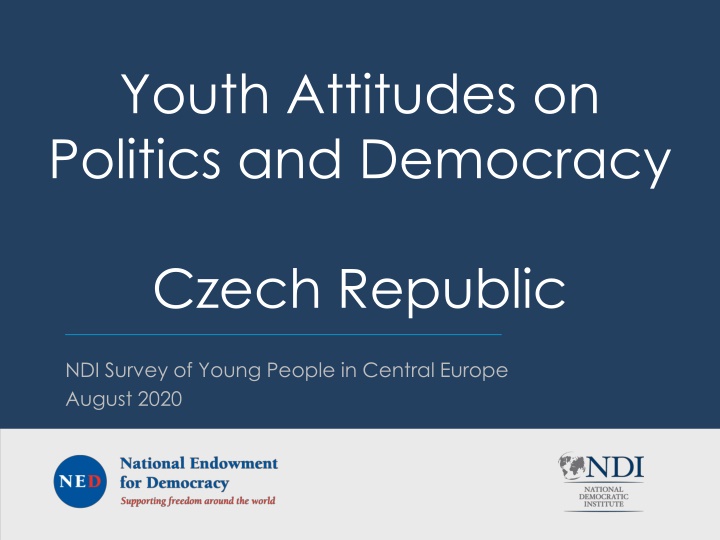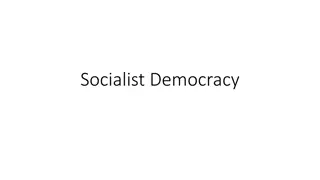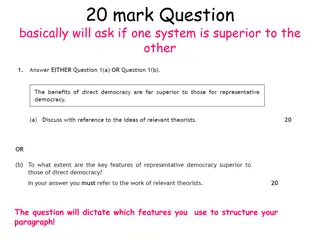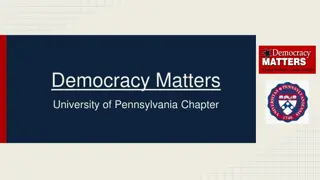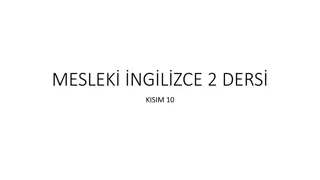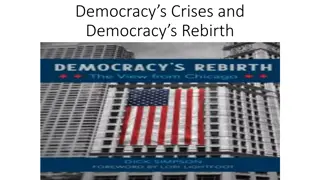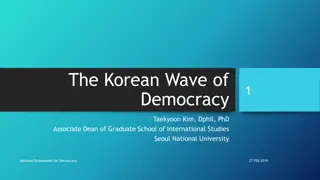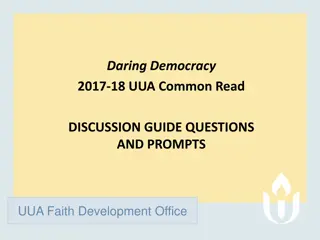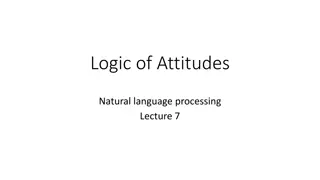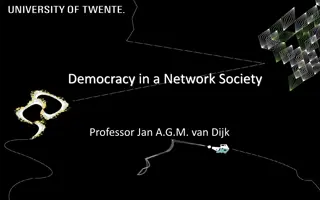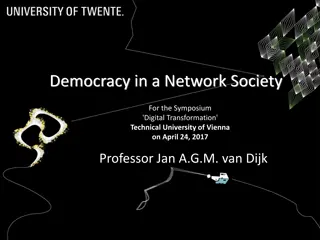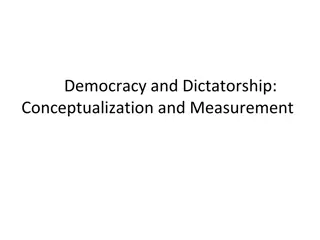Youth Attitudes on Politics and Democracy
The NDI survey conducted in August 2020 in the Czech Republic provides insights into the political attitudes and participation of young people aged 16-29. The research covers topics such as democratic values, identity, political priorities, and opinions on the country's political situation. It reveals levels of satisfaction, interest, and disinterest among the youth regarding politics and public affairs.
Download Presentation

Please find below an Image/Link to download the presentation.
The content on the website is provided AS IS for your information and personal use only. It may not be sold, licensed, or shared on other websites without obtaining consent from the author.If you encounter any issues during the download, it is possible that the publisher has removed the file from their server.
You are allowed to download the files provided on this website for personal or commercial use, subject to the condition that they are used lawfully. All files are the property of their respective owners.
The content on the website is provided AS IS for your information and personal use only. It may not be sold, licensed, or shared on other websites without obtaining consent from the author.
E N D
Presentation Transcript
Youth Attitudes on Politics and Democracy Czech Republic NDI Survey of Young People in Central Europe August 2020
RESEARCH METHODOLOGY FIELDWORK PERIOD SAMPLE DESIGN The sample is statistically representative of the Czech population aged 16-29 in terms of gender, age group, region, and size of community of residence. 19-24 June 2020 SAMPLE SIZE TYPE OF SURVEY 1,006 respondents Age: 16-29 Margin of error: 3 % Online interviews (CAWI)
SOCIO-DEMOGRAPHIC CHARACTERISTICS OF RESPONDENTS GENDER SETTLEMENT SIZE REGION St edo esk Jihomoravsk Moravskoslezsk Hlavn m sto Praha 13% 12% 12% 10% 7% 6% 6% 6% 6% 5% 5% 5% 4% 3% up to 999 inhabitants 14% 1 000 1 999 inhabitants 8% 51% 2 000 4 999 inhabitants 13% steck Jiho esk Vyso ina Olomouck Zl nsk Plze sk Libereck Pardubick Kr lov hradeck Karlovarsk 49% 5 000 19 999 inhabitants 18% 20 000 49 999 inhabitants 11% 50 000 90 000 inhabitants 8% male female above 90 000 inhabitants 28% EDUCATION AGE elementary vocational/secondary without matura completed secondary not continuing at a university completed secondary continuing at a university university 16-17 y.o. 18-21 y.o. 22-25 y.o. 26-29 y.o. 13% 25% 27% 35% 25% 16% 19% 20% 20%
CONTENT 1. POLITICAL PARTICIPATION 2. DEMOCRATIC VALUES 3. IDENTITY 4. POLITICAL PRIORITIES AND SOURCES OF INFORMATION 5. CZECH REGIONAL ELECTIONS OCTOBER 2020
POLITICAL PARTICIPATION Are you satisfied or dissatisfied with the political situation in the Czech Republic? The majority of Czech youth is dissatisfied with the country s political situation. 50% 46% 40% NOTE One-fourth of young Czechs are satisfied with the political situation. 3% of respondents are very satisfied . Those with a higher education background are less satisfied. Women are more likely to say do not know than men. 30% 22% 20% 17% 12% 10% 3% 0% Very satisfied Rather satisfied Rather dissatisfied Not satisfied at all Do not know
POLITICAL PARTICIPATION How interested/not interested in politics and public affairs are you? Slightly over one-half of young people express interest in politics and public affairs 50% 44% 40% NOTE 34% One-tenth (11%) is not at all interested in public affairs. Another third of Czech youth is not very interested. Men overall are more interested in politics than women. Those with vocational education are significantly less interested in politics and public affairs. 30% 20% 11% 9% 10% 1% 0% Very interested Somewhat interested Not very interested Not at all interested Do not know
POLITICAL PARTICIPATION The COVID-19 crisis has increased many young Czechs interest in politics and public affairs. Has the COVID-19 pandemic increased your level of interest in politics and public affairs? 50% 41% 40% NOTE 33% For nearly half of Czech youth, the crisis has not significantly increased their interest in public affairs. Young people 18-21 years old have been the most galvanized by the COVID-19 crisis and those 22-26 years old the least. 30% 20% 13% 10% 10% 3% 0% Definitely Somewhat Not really Not at all Do not know
POLITICAL PARTICIPATION To what extent are you satisfied or dissatisfied with the government? Two thirds of young Czechs are dissatisfied with the government. 50% 44% 40% NOTE The share of those who are very satisfied is 2%. Nearly one-quarter (22%) of young Czechs are not satisfied at all with the current government. 30% 24% 22% 20% 8% 10% 2% 0% Very satisfied Rather satisfied Rather dissatisfied Not satisfied at all Do not know
POLITICAL PARTICIPATION To what extent are you satisfied with the government s communication and information-sharing on the COVID-19 pandemic? Young Czechs are evenly split in their appraisal of the government s communication during the COVID-19 crisis. 50% 42% NOTE 40% Women are more likely than men to say they do not know. Young Czechs aged 26-29 are most likely to be satisfied. 30% 30% 20% 15% 10% 7% 6% 0% Very satisfied Rather satisfied Rather dissatisfied Not satisfied at all Do not know
POLITICAL PARTICIPATION Young Czechs are satisfied with mayors and NGOs, but not with state bodies. To what extent are you satisfied with the work of the following institutions on Covid-19? 14% Mayor of the town/municipality where you reside 20% 39% 7% 21% NOTE 10% NGOs 16% 34% 7% 32% The performance of President Zeman is viewed least favorably. The appraisal of the EU s work elicited a large share of resolutely dissatisfied responses. Nearly one-third do not know enough about the work of NGOs to assess their performance during the crisis. 6% 34% The Czech Government 37% 16% 8% 26% European Union 6% 30% 19% 19% 31% The Czech Senate 4% 31% 10% 24% 40% The Czech Parliament 3% 31% 11% 16% 23% The President 4% 14% 45% 14% 0% 10% 20% 30% 40% 50% 60% 70% 80% 90% 100% Very satisfied Rather satisfied Rather dissatisfied Not satisfied at all Do not know
POLITICAL PARTICIPATION Nearly one-half of Czech youth mention mandatory wearing of face masks as a good measure introduced by the government. Can you name one good measure by the national or local government in response to the pandemic? 48% Mandatory face masks 6% Quarantine NOTE 5% Closed borders Positive measures mentioned include quarantine, closing of national borders, and closing of schools, restaurants, and shops. 4% Limits on public gatherings 4% Closure of schools, restaurants and shops 4% Restricting freedom of movement 4% Promptness of the govt's response 6% Nothing 19% Other 0% 10% 20% 30% 40% 50%
POLITICAL PARTICIPATION Young Czechs believe the government responded effectively and are not very concerned about their professional future. To what extent would you agree or disagree with the following statements: Czech government responded effectively to the pandemic. 5% 19% 56% 16% The way Czech government handled the pandemic crisis and the measures limiting individual rights of the citizens were reasonable and understandable to the situation. 5% 19% 46% 22% 7% NOTE Two-thirds concur that the government s Covid-19 response has been effective. 57% believe that the government favored older generations at the expense of the younger ones in its response to the pandemic. Women are more likely to view the government s response positively. Men tend to be more critical. The government has favored the older generation at the expense of youth in its response to the Covid-19 epidemic 8% 16% 41% 28% 7% The government used the pandemic crisis and extraordinary measures to misappropriate public money. 21% 19% 27% 22% 11% The measures Czech government proposed to stop the further development of the epidemic were too extensive, unduly threatening the functioning of the economy. 8% 14% 30% 37% 12% Due to the pandemic crisis I am concerned about my future professional and economic situation more than before. 15% 26% 27% 22% 10% 0% 10% 20% 30% 40% 50% 60% 70% 80% 90% 100% I don t know I fully agree I somewhat agree I somewhat disagree I fully disagree
POLITICAL PARTICIPATION Please indicate how involved you have been in public affairs in the last two years, or if you are willing to get involved in the future. Young Czechs are much more likely to participate in online petitions or vote in elections than to join a political party. Participating in an online petition or protest 41% 14% 38% Voting in local elections 36% 23% 35% Voting in EP elections 31% 22% 39% Signing a petition on the street or at another place not including the internet NOTE 31% 21% 41% Publicly sharing or expressing your ideas on politics or important public issues through The most common political activity of young people is voting in local elections. Men are more likely to be involved in a political party, do so in the future, and voice political opinions publicly. Less than one-half participated in online petitions, demonstrations, or voted in the EU parliamentary elections. One-fifth participate in volunteering; about one-tenth take part in protests. The lowest level of political engagement was joining a political party. 23% 12% 57% Taking part in a demonstration 15% 21% 57% Volunteering in COVID-19-related initiatives 14% 15% 60% Volunteering (excluding COVID-19 related initiatives) 14% 20% 53% Contacting a politician or local political representative in relation to a particular public 11% 15% 68% Supporting an online crowd-funding campaign 7% 10% 73% Membership in a political party 3% 12% 81% 0% 10% 20% 30% 40% 50% 60% 70% 80% 90%100% Yes, I have been involved No, I have not been involved but I plan to get involved No, I have not been involved and I do not plan to get involved
POLITICAL PARTICIPATION Most young Czechs do not think the COVID-19 crisis has significantly altered the relationship between the government and the opposition. Has the COVID-19 pandemic impacted relations between the government and opposition? 50% 40% NOTE 37% Nearly one-quarter believes that government-opposition relations have soured due to the pandemic. One-quarter holds no opinion. 30% 25% 20% 17% 13% 10% 7% 2% 0% Improved significantly Improved slightly Did not change Deteriorated slightly Deteriorated significantly Do not know
DEMOCRATIC VALUES Young Czechs have a clear preference for democracy. How do you evaluate the two statements below? 60% NOTE 50% 69% believe that a system with a strong leader is bad; 42% say that it is very bad . Women are more likely than men to not express a preference. Those with less education show stronger support for an authoritarian system and weaker support for a democratic system. 42% 39% 40% 34% 27% 30% 20% 14% 12% 12% 12% 10% 4% 4% 0% Very good Fairly good Fairly bad Very bad Do not know Having a strong leader who does not need to consult with parliament and civil society Having a democratic political system in which decisions are made through legislative deliberation and public consultation
2. SOCIAL AND POLITICAL VALUES Three quarters of Czech youth consider democracy the best possible system of government. Do you agree or disagree with the following? Democracy is the best possible system of government 25% 49% 10% 4% 12% NOTE I would be ready to sacrifice some freedoms for health and safety during the pandemic 18% 48% 15% 9% 10% 15% say that it does not matter if the government is democratic. Strong support for substantial restrictions of rights and freedoms to protect the population from the pandemic and other threats. Nearly one-third would trade some freedoms for material benefits. Sometimes, human rights and civil liberties should be restricted in order to better protect people from terrorism and other threats 15% 43% 21% 10% 11% Democracy is the best possible system of government only when it can deliver economic security for people 14% 41% 19% 7% 19% I would be ready to sacrifice some civil liberties to secure higher standards of living 6% 25% 33% 21% 15% It does not matter if the government is democratic or undemocratic 4% 11% 32% 42% 11% 0% 10% 20% 30% 40% 50% 60% 70% 80% 90% 100% Fully agree Somewhat agree Somewhat Disagree fully disagree Do not know
IDENTITY Young Czechs strongly identify with the Czech nation, while very few identify with their church. To what extent do you identify with the following? Czech nation 40% 34% 16% 6% 4% NOTE Almost three-quarters identify at least somewhat with the nation. 61% identify with Europe. Identification with Europe is significantly higher among those with higher education and in urban areas. Local, political, and religious ties are weaker. Europe 27% 34% 22% 11% 5% My local community 17% 38% 24% 14% 7% The political party I have voted or would vote for 3% 15% 24% 44% 15% My church 6% 6% 10% 73% 5% 0% 20% 40% 60% 80% 100% Very much Somewhat Not really Not at all Do not know
IDENTITY The Covid-19 pandemic has increased trust and cooperation among European Union member states. Nearly one-half of Czech youth do not believe that the pandemic has heightened EU member- state trust/cooperation. 50% 40% NOTE 33% One-third (35%) of Czech youth believe that cooperation within the EU has improved during the pandemic. 30% 30% 20% 17% 15% 10% 5% 0% Fully agree Somewhat agree Somewhat disagree Fully disagree Do not know
4. POLITICAL PRIORITIES AND SOURCES OF INFORMATION
POLITICAL PRIORITIES AND SOURCES OF INFORMATION Facebook and online media are the most frequently used sources of information on politics among Czech youth. How frequently do you use these media outlets to follow public affairs? 3% Facebook 29% 34% 21% 13% 4% Publicly available web portals 24% 38% 21% 13% 20% 3% Public television channels 29% 27% 19% NOTE 3% Private television channels 14% 28% 34% 22% Twitter, alternative media, and private blogs are rarely used. Television (public and private) is much more popular than radio stations (public and private). Women follow private TV more frequently and men are more likely to glean news from Twitter. More educated turn to online media outlets; the less educated rely more often on Facebook. 3% Video blogs on Youtube 12% 22% 25% 37% 5% Traditional print media outlets or their websites 9% 20% 31% 36% 3% Private radio broadcasting 6% 21% 35% 34% 4% Public radio broadcasting 6% 14% 30% 47% 4% Twitter 7% 9% 16% 64% 5% Alternative media 3% 8% 22% 62% 4% Private blogs 3% 6% 23% 64% 0% 10% 20% 30% 40% 50% 60% 70% 80% 90% 100% Very often Rather often Rarely Not at all Do not know
POLITICAL PRIORITIES AND SOURCES OF INFORMATION Public TV and radio are viewed as the most trustworthy media sources for COVID-19 information by young Czechs. To what extent do you trust or distrust the following on COVID-19 information? Public television channels 13% 25% 46% 8% 9% Public radio broadcasting 14% 18% 40% 8% 20% 9% Publicly available web portals (online only) 25% 45% 8% 13% NOTE Private radio broadcasting 25% 5% 42% 11% 17% Alternative media is most trusted by those with less education. Facebook, Twitter, and private blogs are seen as untrustworthy on COVID- 19. Traditional print media outlets or their websites 26% 6% 38% 11% 18% Private television channels 34% 5% 38% 16% 7% Video blogs on Youtube 22% 8% 30% 17% 22% Facebook 43% 3% 23% 20% 11% Twitter 24% 3% 19% 21% 33% Alternative media 24% 3% 18% 27% 27% Private blogs 28% 2% 14% 23% 32% 0% 10% 20% 30% 40% 50% 60% 70% 80% 90% 100% Fully trust Somewhat trust Somewhat distrust Fully distrust Do not know
POLITICAL PRIORITIES AND SOURCES OF INFORMATION To what extent is each of the following issues a serious problem in your country? Young Czechs feel most threatened by corruption, rising costs of living, and environmental issues/climate change. Rising prices, costs of living 38% 40% 15% 3% 5% Corruption 38% 35% 14% 2% 11% 34% Environment 39% 20% 4% 4% Climate change 5% 32% 35% 22% 6% NOTE Immigration, threats to traditional culture, terrorism, and evolving gender roles are viewed as least threatening by Czech youth. One-fifth view the COVID-19 pandemic as a very serious problem, another 39% see it as somewhat of a problem. Women are more likely to see structural threats (e.g. rising living costs and unemployment) than men. Women fear terrorism and crime at higher rates than men. Economic recovery 12% 24% 41% 20% 3% Pensions 21% 41% 23% 6% 10% Education 24% 36% 27% 8% 5% Healthcare 22% 37% 28% 7% 5% COVID-19 Pandemic 19% 39% 31% 6% 5% Democratic decline and rising authoritarianism 24% 31% 23% 6% 15% Unemployment 4% 23% 33% 33% 7% Crime 16% 37% 37% 5% 5% Russian military buildup and aggression against its 17% 32% 26% 10% 16% Immigration 20% 27% 34% 13% 6% Threats to traditional culture 13% 27% 35% 16% 8% Terrorism 15% 20% 39% 19% 7% Evolving gender roles 11% 17% 28% 26% 17% 0% 10% 20% 30% 40% 50% 60% 70% 80% 90% 100% A very serious problem Somewhat of a problem Not a significant problem Not at all a serious problem Do not know
POLITICAL PRIORITIES AND SOURCES OF INFORMATION To what extent do you agree or disagree with the following? A minority of young Czechs believes alternative theories of COVID-19 s origins. COVID-19 originated in the Wuhan food market and spread out around the world because the Chinese government failed to admit the virus was being transmitted among people on time 6% 13% 30% 38% 14% NOTE 68% believe that COVID-19 originated from a Wuhan food market. One-third believes that COVID-19 was released by Chinese scientists and another 19% claim scientists in the U.S. released COVID-19. COVID-19 virus was released by Chinese scientists 19% 18% 12% 23% 27% 5% COVID-19 virus was released by US scientists 38% 20% 14% 22% 0% 20% 40% 60% 80% 100% Fully agree Rather agree Rather disagree Fully disagree Do not know
REGIONAL ELECTIONS OCTOBER 2020 Do you plan to vote in regional elections planned for October 2020?* The majority of young Czechs plan on voting in the regional elections in October 2020. 50% 40% NOTE 34% Overall turnout in the 2016 regional elections was 35%. 30% 25% 20% 16% 8% 10% 7% 0% Certainly yes Probably yes Probably no Certainly no Undecided *Does not include respondents from Prague, which has different election schedule
REGIONAL ELECTIONS OCTOBER 2020 Why will you certainly not vote in regional elections planned for October 2020? * Lack of interest in politics overall and in regional elections specifically are behind young Czechs unwillingness to vote. 50% 40% 36% 36% 30% 21% 20% 10% 7% 0% I am not at all interested in politics I am not interested in regional elections Other reason I do not know *Does not include respondents from Prague, which has different election schedule
REGIONAL ELECTIONS OCTOBER 2020 Does the performance of political parties on the national level influence how you vote in regional elections?* The majority of young Czechs admit that parties performance on the national level influence how they vote in regional elections. 50% 41% 40% 30% 21% 20% 16% 10% 5% 1% 0% Rather yes Rather not Not at all I do not know I cannot vote *Includes only respondents who said they will certainly vote, rather vote or are undecided about their participation. Does not include respondents from Prague, which has a different election schedule.
